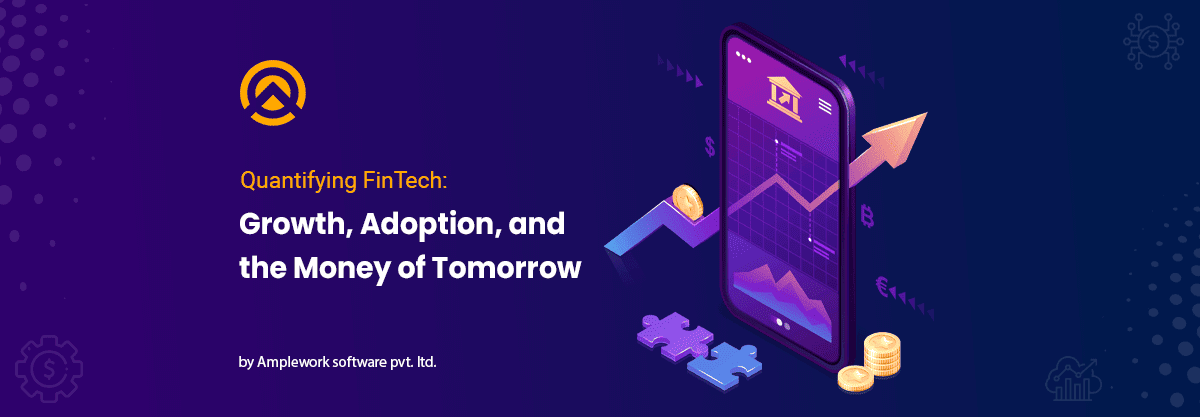You would not believe that in the time you are taking to read this sentence, a financial transaction can take place. In other words, the technology-aided solutions that are transforming the traditional financial process are well recognized as fintech or financial technology. The development of such technologies is completely transforming the world. In this era heavily influenced by digital advancements, people seek diverse mobile app services to streamline their activities with minimal effort.
The success of financial mobile app services in attracting users is directly proportional to the extent of advancements and features they offer. Within the banking sector, the ascent of mobile apps is orchestrating significant transformations, gradually supplanting conventional banking practices. These mobile banking applications bring forth a myriad of advantages, including swift banking services, convenient access to banking operations, uninterrupted availability around the clock, provision of value-added services, remote banking capabilities, and precise monitoring of financial transactions. Despite the plethora of solutions these mobile banking apps provide, a predominant concern among users pertains to the security of these applications.
Today, fintech stands as a cornerstone of modern finance, embodying a potent blend of innovation, efficiency, and accessibility. It is more than just a buzzword; it is a driving force behind the evolution of how we perceive and engage with money. As technology continues its relentless march forward, so does the influence of fintech on our daily lives.
The research and markets present similar aspects. As shown below the global fintech market value was observed at USD 131.14 billion in the year 2021. And expected to grow to the value of USD385.93 billion by the year 2027. For this sector, the global fintech market is expected to grow at a Compound Annual Growth Rate (CAGR) of 19.7% within this forecast timeframe.
 Source: Research and Markets
Source: Research and Markets
Blog Highlights
This blog is all about the possible aspects of fintech mobile app development and practices. These are becoming the essential needs of people in this digitally advanced era. The major highlights of this masterpiece are the major benefits of using fintech app development services and the types of fintech advancement available in the market. A quick read of this blog is capable of enhancing knowledge and providing clearance of the doubts related to fintech mobile app development practices.
Major Advantages of Fintech App Development Services
The rapid evolution of financial technology (fintech) has given rise to a new era in which innovative app development services play a pivotal role. Fintech app development services offer a multitude of advantages, reshaping the way individuals and businesses manage their finances. Here, we explore the major benefits that come with embracing fintech app development.
1. Advanced Accessibility
Fintech app development services break down traditional barriers to financial services. With the power of mobile devices, users gain unprecedented access to banking, investment, and payment services anytime, anywhere. This enhanced accessibility is particularly beneficial for those in remote or underserved areas, fostering financial inclusion on a global scale.
2. Personalized Financial Services
Fintech apps leverage advanced analytics and artificial intelligence to provide personalized financial solutions. Through data-driven insights, users receive tailored recommendations for budgeting, investment strategies, and financial planning. This personalized approach not only meets individual preferences but also enhances the overall effectiveness of financial decision-making.
3. User Experience at its Peak
User experience is a cornerstone of fintech app development. These services are designed with a user-centric approach, offering intuitive interfaces and seamless interactions. From simplified account management to intuitive investment platforms, FinTech apps prioritize a smooth and efficient user experience, making financial activities more engaging and straightforward.
4. Effective Cross-border Transactions
Fintech apps have transformed the landscape of cross-border transactions. Through blockchain and other innovative technologies, these services facilitate faster, more secure, and cost-effective international money transfers. The traditional barriers associated with currency exchange and transaction delays are significantly minimized, fostering a more interconnected global financial environment.
5. Cost-Effective Solutions
For both users and financial institutions, fintech app development services contribute to cost savings. Automation of various processes, such as transactions, account management, and customer support, reduces operational costs for financial entities. Simultaneously, users benefit from lower fees, reduced transaction costs, and access to budget-friendly financial products.
6. Real-Time Financial Insights
Fintech apps empower users with real-time insights into their financial health. Through dynamic dashboards and instant updates, individuals gain a comprehensive view of their accounts, transactions, and investment portfolios. This real-time visibility enhances financial awareness, enabling users to make informed decisions promptly.
7. Adaptability and Scalability
Fintech app developers provide services that are designed to be adaptable and scalable. This flexibility allows for the seamless integration of new features, technologies, and compliance measures. Whether accommodating growing user bases or evolving regulatory requirements, fintech apps can scale to meet the dynamic demands of the financial landscape.
8. Security and Fraud Prevention
Security is a paramount concern in fintech app development. Robust encryption, biometric authentication, and multi-factor authentication measures ensure the security of financial transactions and sensitive data. Additionally, advanced algorithms and machine learning models are employed to detect and prevent fraudulent activities, safeguarding users and financial institutions alike.
9. Advancement of Financial Literacy
Fintech apps contribute to financial education and literacy by offering educational resources, interactive tools, and informative content within the app interface. This fosters a greater understanding of financial concepts, investment strategies, and overall money management, empowering users to make informed financial decisions.
10. Automated Financial Planning
Fintech apps integrate automated financial planning tools that analyze user data to provide personalized budgeting advice and investment recommendations. This streamlines financial planning processes, helping users set and achieve their financial goals with greater efficiency.
11. Collaborative Financial Management
Many fintech apps facilitate collaborative financial management, allowing users to share financial goals, budgets, and expenses with family members, business partners, or financial advisors. This collaborative approach enhances transparency and coordination in managing shared finances.
12. Micro Investing Opportunities
Fintech apps introduce micro-investing features, enabling users to invest small amounts of money in diversified portfolios. This micro-investing approach makes investment opportunities more accessible to individuals who may have limited capital, fostering a culture of regular, small-scale investments.
Some fintech apps leverage blockchain technology to implement smart contracts, self-executing contracts with the terms of the agreement directly written into code. This automation of contractual processes enhances transparency, reduces the need for intermediaries, and ensures secure and tamper-proof execution of financial agreements.
Read more: How AI Empowers the FinTech Industry in 2024?
Different Practices of Fintech Operations
The landscape of financial technology, or fintech, is a dynamic and ever-evolving realm, characterized by a multitude of innovative practices that redefine how we interact with and manage our finances. Fintech operations encompass a wide array of strategies and methodologies aimed at enhancing efficiency, accessibility, and the overall user experience. Here, we delve into some key practices that illustrate the diverse and transformative nature of fintech operations.
Digital Payment Solutions
Fintech operations in the realm of digital scanning payments extend beyond the convenience of mobile wallets and peer-to-peer transfers. The rise of contactless payments, facilitated by near-field communication (NFC) technology, has transformed the way individuals make everyday transactions. Moreover, innovations in biometric authentication, such as fingerprint and facial recognition, enhance the security of digital payment processes, ensuring a seamless and secure user experience.
Blockchain technology and Cryptocurrencies
The influence of blockchain technology goes beyond cryptocurrencies. Smart contracts, powered by blockchain, automate and enforce contractual agreements without the need for intermediaries. In addition to Bitcoin and Ethereum, the emergence of decentralized finance (DeFi) platforms has expanded the use of cryptocurrencies for lending, borrowing, and yield farming, fostering a more open and accessible financial ecosystem.
Robo Adviser in Asset Management
Robo-advisors continue to revolutionize wealth management by not only automating investment decisions but also incorporating machine learning algorithms. These algorithms analyze market trends, economic indicators, and even social sentiments to provide more sophisticated and personalized investment advice. Additionally, the integration of ethical and sustainable investment criteria reflects a growing trend toward aligning financial goals with broader environmental, social, and governance (ESG) considerations.
Insurtech Innovations
In the insurance sector, the integration of telematics and IoT devices into insurance policies enables real-time data collection for risk assessment. This data-driven approach not only allows insurers to tailor policies based on individual behavior but also promotes a shift toward preventative and personalized insurance models. Furthermore, blockchain is being leveraged to streamline claims processing, reducing fraud and improving transparency.
Regtech for Regulatory Compliance
Regtech solutions are evolving to offer not just streamlined compliance but also predictive analytics to anticipate regulatory changes. Machine learning algorithms sift through vast regulatory datasets, helping financial institutions adapt to evolving compliance requirements proactively. These innovations reduce compliance costs, enhance accuracy, and ensure that financial entities stay ahead of regulatory shifts.
Biometric Authentication and Identity Verification
Biometric authentication stands as a cornerstone in the arsenal of fintech operations, revolutionizing how users securely access financial services. Gone are the days of relying solely on passwords; now, fingerprint scanning, facial recognition, and iris scanning offer a seamless and highly secure means of identity verification. This not only enhances the security of financial transactions but also provides a user-friendly experience, reducing the reliance on traditional authentication methods prone to hacking and unauthorized access.
Open Banking Initiative
Open banking initiatives are fostering a collaborative financial ecosystem. Fintech companies are leveraging open banking APIs not only for data sharing but also to facilitate seamless fund transfers between different financial institutions. This interconnected approach not only enhances user convenience but also encourages the development of innovative financial products and services through partnerships and collaborations.
Cybersecurity Measures
The rapid digitization of financial services has heightened the importance of cybersecurity measures. Fintech operations now employ advanced encryption algorithms, biometric authentication methods, and secure APIs to fortify their platforms against cyber threats. Continuous monitoring, threat intelligence, and collaboration with cybersecurity experts are becoming integral components of fintech cybersecurity strategies, ensuring the resilience of financial systems in the face of evolving cyber risks.
Artificial Intelligence in Customer Services
AI is advancing customer service in fintech by not only providing automated responses but also by understanding and predicting user needs. Natural language processing enables chatbots to comprehend and respond to user queries conversationally. Moreover, AI-driven predictive analytics helps in offering personalized financial advice, detecting potential issues, and providing proactive solutions, thereby enhancing the overall customer experience.
Related Blog: How Can AI Help Improve Customer Experience and Retention?
Conclusive Outlines
The development of software has now become an essential need and in the coming future, we can expect highly advanced practices in this field. The emergence of financial technology holds a bright future that continues to grow with its accurate and advanced operations. Currently, fintech app solutions are continuously increasing and providing different benefits as mentioned in the above sections. This blog highlights the major aspects of fintech operations and provides valuable insights for the readers.
Amplework, a leading force in mobile app development with a rich history of over 5+ years in the field, deeply understands the pivotal role of financial technology in advancing financial operations. Our dedicated team consistently surpasses client expectations, building a reputation for reliability and trustworthiness. We have achieved noteworthy milestones of $200 million in revenue by supporting various organizations and steadfastly upholding standards. Delve into our website to explore the exceptional fintech app development services we offer. Choose Amplework to embark on a transformative journey, ensuring the resilient security of your financial assets in the ever-evolving landscape of mobile banking apps, as illuminated in the context of Financial Technology Statistics: Growth, Adoption, and the Future of Money.










